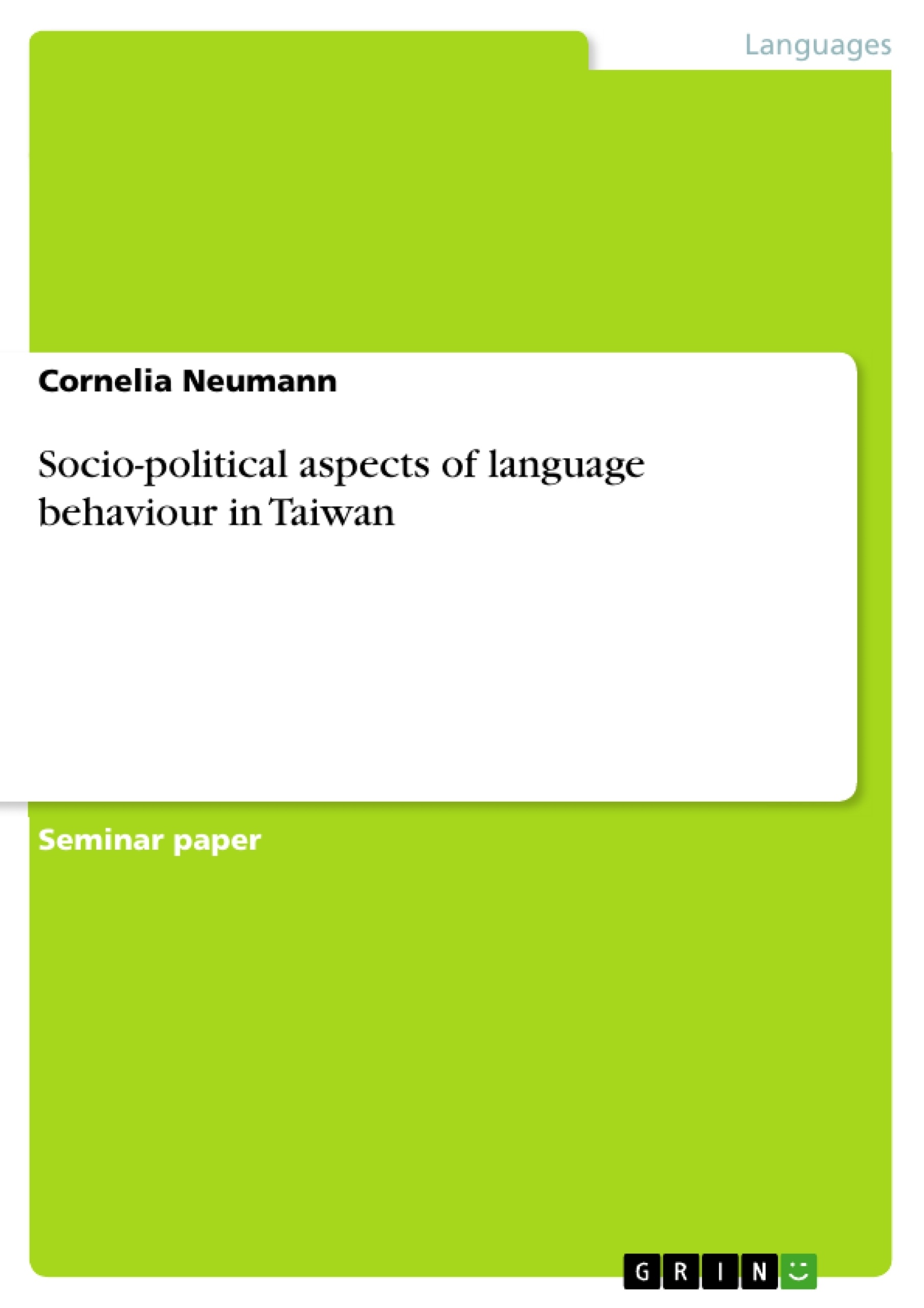The Seminar ‘Sociolinguistics and Anthropological Linguistics: A Merger’ included an intensive e-mail exchange with Taiwanese students. My keypal ‘Cherlene’, told about the linguistic diversity of her country. Besides, I had the opportunity to read the letters which were exchanged between my classmates and their assigned Taiwanese students.
People in Taiwan have to deal with a multilingual society. Although Mandarin Chinese is the official language, there are in fact several more languages one is confronted with in everyday life. Cherlene pointed out that choice of code differs not only between social classes, ethnic communities and generations, but also between other domains of life such as school, university, jurisdiction, the media and advertising.
Each of our e-mail partners was multi- or at least bilingual in Mandarin plus one or two other Chinese languages. Besides, all of them knew English or/and another European language. The reality of Taiwanese society requires the ability to switch codes flexibly according to the occasion.
This complex situation is the result of political changes, power-shifts, two main, contradictory waves of language promotion, and a strict language policy by the government until the late 1980s. Consequently, it is indispensable to look at historical and social developments in order to understand and evaluate the present situation.
This paper is based on Cherlene‘s first-hand information and the general impression received from the other e-mails. The linguistic information is embedded in a historic-political context, because I was especially interested in how such a situation could develop and how language use reflects power-relations.
Table of Contents
- INTRODUCTION
- A SHORT SURVEY OF TAIWANESE HISTORY
- TERMINOLOGY
- POPULATION AND LANGUAGE DISTRIBUTION
- A NEW OFFICIAL LANGUAGE
- CRITICISM I
- A NEW IDENTITY
- NEW LANGUAGE ATTITUDES
- STATUS QUO
- GROUP SOLIDARITY
- JURISDICTION
- ADVERTISING
- CRITICISM II
- CONCLUSION
- APPENDIX:
- CHERLENE, MAY 11 1999
- CHERLENE, MAY 21ST, 1999
- CHERLENE, MAY 30TH, 1999
- CHERLENE. JUNE 7TH 1999.
- CHERLENE, JUNE 16TH,
- REFERENCES
- PRIMARY SOURCES
- SECONDARY SOURCES
Objectives and Key Themes
This paper investigates the socio-political aspects of language behavior in Taiwan, focusing on the historical and social developments that have led to the current multilingual situation. The author analyzes the impact of political changes, power shifts, and language policies on the use and attitudes towards different languages in Taiwanese society. This paper explores the relationship between language use and power relations, examining how language choices reflect and reinforce societal structures.
- The historical and social context of language use in Taiwan.
- The influence of political changes and power shifts on language policies and language attitudes.
- The impact of different language policies on language diversity and the perception of languages in Taiwan.
- The role of language in shaping identity and social relations in Taiwan.
- The relationship between language use and power structures.
Chapter Summaries
The introduction outlines the context of the paper, describing the multilingual society in Taiwan and the e-mail exchange between the author and Taiwanese students. It highlights the complex interplay of languages in various domains of life, reflecting social class, ethnic communities, generations, and specific contexts. The paper emphasizes the need to understand the historical and social context of language use to interpret the current situation.
The chapter "A Short Survey of Taiwanese History" traces the history of Taiwan, highlighting key events and their impact on the linguistic landscape. It discusses the arrival of different groups of people, including the indigenous population, Chinese immigrants, and Japanese colonizers, and their respective languages. The chapter focuses on the impact of the Japanese colonization and the subsequent return to Chinese rule, emphasizing the political and social context that shaped language policies and attitudes.
The chapter "Terminology" explores the various terms used for the major local vernacular, highlighting the complexities of language classification and the impact of power dynamics on terminology. The author discusses the preference for the term "Taiwanese" and its implications for the perception of different languages in Taiwan.
Keywords
The key keywords and topics of this paper include Taiwan, language behavior, sociolinguistics, anthropological linguistics, multilingualism, language policy, language attitudes, power relations, historical context, identity, and Chinese languages.
Frequently Asked Questions
What is the official language of Taiwan?
Mandarin Chinese is the official language of Taiwan, but the society is highly multilingual, with several other Chinese languages used in daily life.
What other languages are spoken in Taiwan?
Besides Mandarin, major languages include Taiwanese (Hokkien), Hakka, and various indigenous languages, along with English and other European languages among students.
How did history shape Taiwan's linguistic landscape?
Linguistic diversity is a result of political changes, including Japanese colonization, the return to Chinese rule, and strict language policies enforced until the late 1980s.
What is the significance of "Code-Switching" in Taiwan?
Code-switching is the ability to switch between languages flexibly depending on the social context, such as university, media, or advertising, reflecting power relations and identity.
How does language use reflect power structures?
Language choice often indicates social class or ethnic solidarity. The promotion of Mandarin as the official language was a tool for political control and national unification.
Why is the term "Taiwanese" sometimes controversial?
Terminology reflects identity politics. Choosing to call the local vernacular "Taiwanese" versus a "dialect" can signify different political stances regarding independence and heritage.
- Quote paper
- Cornelia Neumann (Author), 1999, Socio-political aspects of language behaviour in Taiwan, Munich, GRIN Verlag, https://www.grin.com/document/31464



